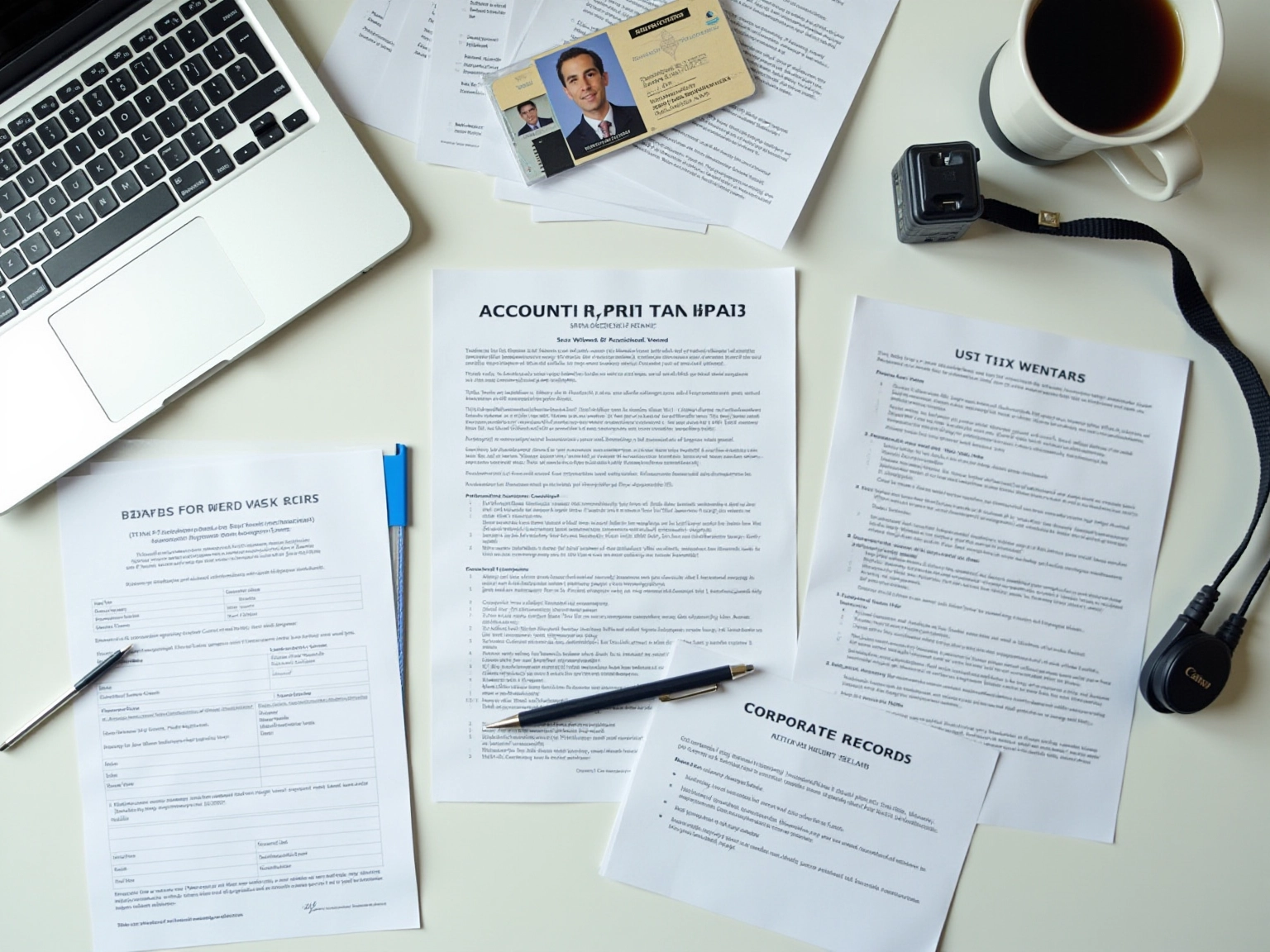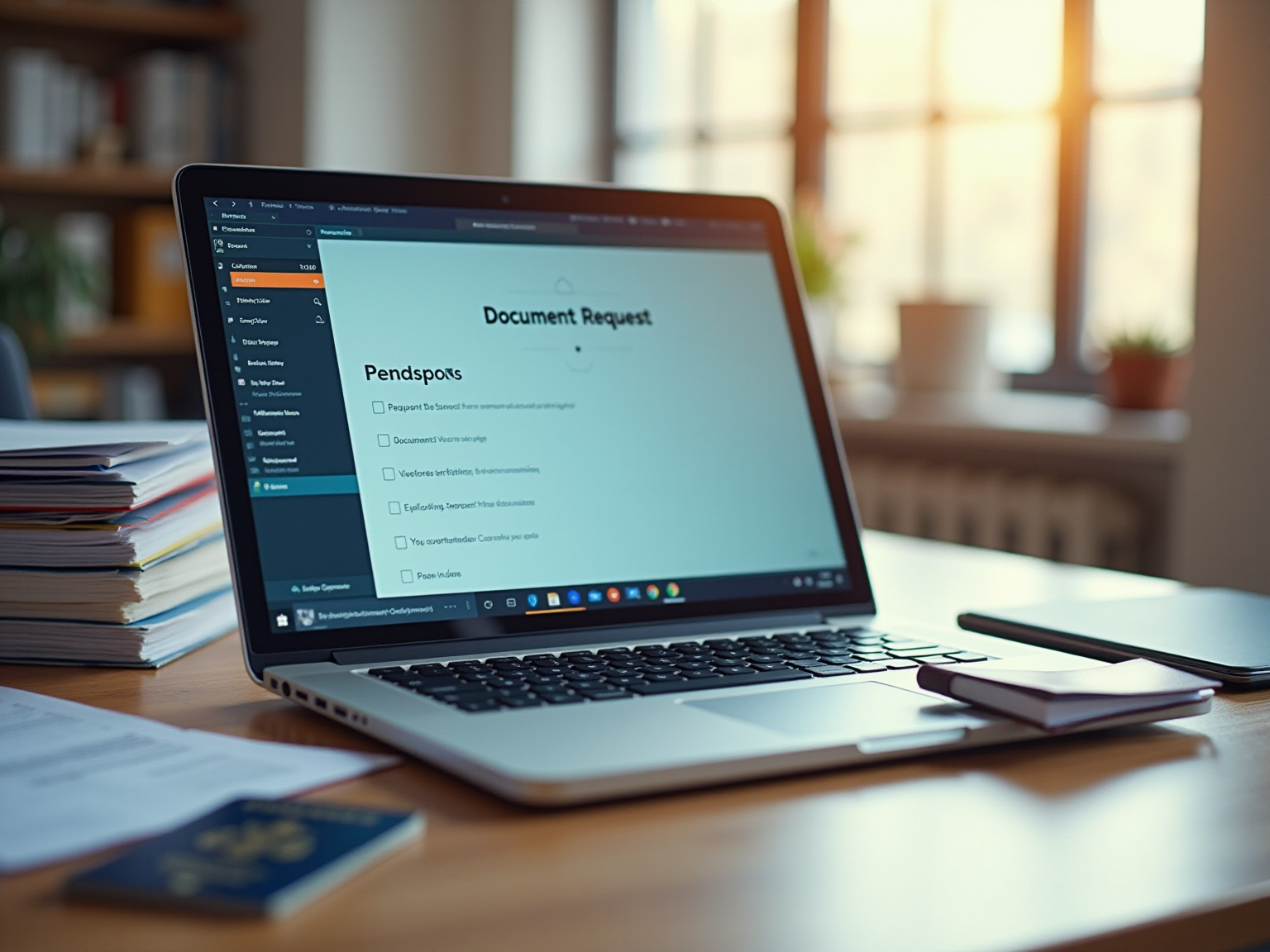Overview
The article titled “How to Request Documents: A Step-by-Step Guide for Success” serves as an essential resource for effectively navigating the process of document requests. It systematically outlines organized steps and delves into the pertinent legal frameworks, ensuring readers grasp the critical aspects of this task. By emphasizing the necessity of clarity in requests, the article highlights the transition to digital management systems, which significantly enhances efficiency. Furthermore, it elucidates the rights individuals possess under regulations such as GDPR and FOIA, thereby guaranteeing that document requests are managed properly and in a timely manner.
Key Highlights:
- Document requests are formal inquiries for obtaining specific files or information from individuals or organizations, crucial in legal, business, and personal contexts.
- 45% of small and midsize businesses still rely on paper records, leading to inefficiencies and risks such as damage and loss.
- Transitioning to digital management systems like Glasscubes enhances accessibility, streamlines processes, and improves business continuity.
- 80% of employees require mobile access to files, indicating a shift towards remote work and the need for effective information management solutions.
- Common document types requested include personal identification, financial records, legal documents, and corporate records.
- Legal frameworks like GDPR and FOIA govern document requests, ensuring individuals’ rights to access their data and promoting transparency.
- Standard response times for document requests are typically within one month under GDPR and 20 working days under FOIA.
- Challenges in document requests include delays, incomplete information, and denials; proactive follow-up and clear communication are essential for resolution.
- Utilizing automated tools for reminders and tracking can significantly improve response rates and client engagement.
- If a document request is denied, understanding your rights and the appeals process is crucial for addressing the denial effectively.
Introduction
In the intricate landscape of information exchange, document requests serve a pivotal role across various sectors, including legal proceedings and business transactions. These formal inquiries are essential for acquiring specific documents or information. However, navigating the complexities of making and managing these requests often presents significant challenges.
As organizations increasingly transition towards digital solutions, grasping the nuances of document requests becomes critical for enhancing efficiency and ensuring compliance. This article delves into the intricacies of document requests, exploring their significance, the types of documents that can be requested, and the legal frameworks that govern them.
Additionally, it provides practical guidance on formulating effective requests, overcoming common challenges, and utilizing advanced tools to streamline the process. Ultimately, this paves the way for improved communication and productivity in professional settings.
Understanding Document Requests: An Overview
Formal inquiries serve as essential appeals for requesting documents that aim to secure specific files or information from individuals or organisations. These demands are prevalent across various contexts, including legal proceedings, business transactions, and personal data access. Understanding the aim and framework of information inquiries is crucial for ensuring that the required details are acquired effectively and precisely.
In the business realm, the reliance on paper records remains significant, with 45% of small and midsize businesses still depending on physical documentation. This dependence necessitates substantial physical storage and exposes organisations to risks such as damage and loss, which can disrupt operations and hinder productivity. Notably, the average office worker uses 10,000 sheets of paper per year, underscoring the inefficiencies associated with paper-based processes.
Transitioning to digital file management systems, such as Glasscubes, streamlines processes, enhances accessibility, and improves business continuity, providing a competitive edge. A case study titled “The Risks of Relying on Paper Records” illustrates that businesses relying on paper face significant operational challenges, reinforcing the urgent need for digital solutions.
The importance of paperwork inquiries is further underscored by the fact that 80% of employees now require access to files via mobile devices, indicating a shift towards remote work. This trend highlights the necessity for organisations to implement effective information management solutions that facilitate rapid and secure access to data.
Inquiries can range from simple questions for personal identification to intricate demands involving multiple documents across various departments, often necessitating requests for specific files. Mastering the art of articulating these inquiries effectively can significantly enhance communication and expedite the information-gathering process. For instance, successful filings in legal situations frequently include clear specifications and timelines, ensuring that all parties are aligned on expectations.
Expert insights reveal that a well-organised inquiry, involving requests for documents, not only increases the likelihood of obtaining necessary information but also fosters stronger connections between the requesting and responding parties. By leveraging tools such as Glasscubes, accounting firms can refine their document request procedures, ensuring real-time insight into request statuses and minimising the time spent on follow-ups. With features like automated reminders and organised communication, this platform enhances client engagement and boosts response rates.
Sophie Montgomery from TaxAssist Accountants reported an impressive 288 hours saved in just one tax season, exemplifying the efficiency gains realised through the use of Glasscubes. This method not only conserves time but also elevates overall efficiency, making it an indispensable resource for accounting managers striving to enhance their file management practices.
Identifying the Documents You Can Request
Determining the specific files required before submitting an inquiry is essential for ensuring a smooth workflow. Common types of records that may be needed in accounting include:
- Personal Identification: This category encompasses essential documents such as passports, driver’s licences, and national ID cards, which are often necessary for verifying client identities.
- Financial Records: Accountants frequently require financial materials, including bank statements, tax returns, and payroll information. These records are crucial for accurate financial reporting and compliance.
- Legal Documents: Contracts, agreements, and court orders fall under this category. They are vital for ensuring that all legal obligations are met and for maintaining transparency in financial transactions.
- Corporate Records: Documents such as articles of incorporation, bylaws, and meeting minutes are essential for understanding a company’s structure and governance.
Understanding the types of materials relevant to your inquiries while requesting documents not only streamlines the process but also minimises delays in obtaining critical information. For instance, companies utilising file management software have reported a 50% reduction in turnaround times, significantly enhancing their operational efficiency. With features like automated reminders and real-time progress tracking, the platform guarantees that feedback cannot be lost or overlooked, keeping all stakeholders informed.
As Sophie Montgomery from TaxAssist Accountants observed, users have reported saving an astounding 288 hours in just one tax season. Moreover, successfully identifying crucial paperwork can lead to improved outcomes in financial audits, as illustrated by case studies where accountants have effectively optimised their inquiries by requesting pertinent documents, resulting in substantial time savings and increased client satisfaction. Glasscubes also tackles common challenges associated with email communication, such as the risk of misplaced responses and the necessity of following up on overdue items, by providing a comprehensive and organised response structure.

Legal Rights and Regulations Governing Document Requests
When submitting materials inquiries, it is crucial to comprehend the legal rights and regulations that oversee these procedures. Key considerations include:
- Data Protection Laws: The General Data Protection Regulation (GDPR) grants individuals the right to access their personal data held by organisations. This includes the ability to obtain copies of documents that contain their information, ensuring transparency and accountability in data handling. The GDPR has altered the power dynamic in favour of consumers, providing them with increased authority over their personal data and its usage by companies, enabling them to seek data access, erasure, and corrections.
- Freedom of Information Act (FOIA): This act enables individuals to seek information from public authorities, further promoting transparency. Recent updates in 2025 have improved the processes and timelines for these inquiries, enhancing the efficiency of information retrieval.
- Compliance Obligations: Organisations are mandated to respond to inquiries within specified timeframes, typically within 30 days for GDPR inquiries. It is crucial that they do not disclose sensitive information without proper authorisation, as failure to comply can lead to significant legal repercussions. For instance, organisations with robust security measures, including AI and automation, report an average cost of a data breach at $3.60 million, which is $1.76 million less than breaches at organisations that do not use these capabilities. This underscores the importance of compliance, as non-compliance can lead to substantial financial risks.
As Rob Sobers, a software engineer specialising in web security, notes, “Even though the GDPR has had mixed reviews and results, almost everyone can agree that it is a step in the right direction for data security and privacy.” Comprehending these legal structures is essential for both seekers and entities to ensure that requesting documents and paperwork inquiries are handled suitably and in compliance with the law.
Furthermore, shifting from conventional email communication to a new platform can greatly simplify requesting documents for files. By employing this tool, accounting firms can evade the disorder of lengthy email exchanges, guaranteeing that all client information is structured and readily available. The platform includes automated reminders and centralised file storage, which not only increases response rates but also improves client satisfaction by decreasing processing times.
Insights from compliance officers emphasise the importance of following these regulations to uphold trust and accountability in record management. Additionally, this platform provides specialised onboarding support, promoting a more structured and effective procedure for accounting firms in handling file inquiries. User testimonials highlight the simplicity and effectiveness achieved with Glasscubes, making it a valuable resource for accounting managers aiming to enhance their handling processes.

Step-by-Step Process for Making a Document Request
To guarantee a successful file appeal, follow these organised steps:
-
Determine the Purpose: Clearly articulate the reason for your inquiry and specify the exact information you require. This clarity will streamline the process and help the recipient understand your needs.
-
Identify the Recipient: Ascertain who within the organisation is responsible for managing file inquiries. Knowing the right contact can significantly expedite your request.
-
Draft Your Appeal: Compose a clear and concise appeal. Identify the papers required and the reasoning behind requesting documents. Including relevant details, such as dates or specific identifiers, can assist in locating the documents more efficiently.
-
Submit the Inquiry: Utilise the appropriate channel for submission—whether it be email, an online form, or postal mail—to ensure your inquiry reaches the right person promptly.
-
Keep Records: Maintain a copy of your inquiry and any related correspondence. This documentation is essential for monitoring the progress of your inquiry and acts as a reference for future interactions.
-
Follow Up: If you do not receive an answer within the expected timeframe, proactively follow up with the recipient. This step is crucial, as research shows that 70% of team members think fewer meetings and emails would improve productivity, emphasising the necessity for efficient communication.
By applying these measures, you can streamline your file procurement process, which includes requesting documents, ensuring prompt responses, and effective information collection. In a setting where 45% of small and midsize companies still depend on paper files, moving to organised information inquiries can greatly decrease inefficiencies and improve productivity in professional services. Furthermore, utilising tools such as Glasscubes, which provides an automated reminder feature enabling you to send unlimited notifications on a customisable schedule, can further simplify your paperwork processes.
This feature not only saves time but also ensures timely data submission, making it easier for accounting firms to manage their workflows effectively and enhance client engagement. Discover how Glasscubes can enhance your file inquiry management by watching our on-demand demo or arranging a personalised session with one of our Product Specialists.

Common Challenges and FAQs in Document Requests
When navigating the process of requesting documents, several challenges can emerge that may obstruct efficiency. Below are some prevalent issues along with practical solutions and frequently asked questions that can help streamline the process:
- Challenge: Delays in Response
Solution: To mitigate delays, ensure that your request is articulated clearly and concisely. If a prompt reply is not received, follow up quickly to emphasise the urgency of your request.
Statistics show that companies employing efficient document management solutions have attained a notable 50% decrease in response times, highlighting the effect of streamlined communication. The automated reminder function in the platform enables you to send unlimited notifications on a straightforward schedule or tailor them for particular days, ensuring that clients are encouraged to provide essential information without the inconvenience of lengthy email exchanges. Additionally, dedicated onboarding assistance can further enhance client information gathering and engagement, ensuring that all parties are aligned from the outset.
- Challenge: Incomplete or Incorrect Information
Solution: To avoid misunderstandings, double-check your request for accuracy. Providing comprehensive details can significantly reduce the likelihood of receiving incomplete information. This proactive approach not only enhances clarity but also fosters a more efficient exchange of information by requesting documents. Clients have indicated that utilising Glasscubes has enhanced their capability to monitor pending tasks, resulting in faster uploads and reduced occurrences of duplicated submissions from various team members. - FAQ: What if my submission is denied?
Answer: If your request is denied, you have the right to seek clarification regarding the reasons for the denial. Depending on the context, you may also have the option to contest the decision, ensuring that your concerns are addressed. - FAQ: How long should I wait for a reply?
Answer: While response times can vary, organisations are generally required to respond within one month for personal data requests under GDPR regulations. Comprehending these timelines can aid in establishing practical expectations and enhancing planning.
Tackling these frequent obstacles efficiently can result in a more structured and effective process for obtaining materials, ultimately improving client involvement and contentment. By utilising specialised onboarding support and automated notifications, accounting firms can enhance their workflows, ensuring that requesting documents are handled with minimal delays and maximum precision. As highlighted in the Slack State of Work Report 2023, 70% of team members feel that fewer meetings and emails would increase productivity, and 77% say that being able to automate routine tasks would significantly improve their productivity.
Moreover, platforms like these consolidate and organise files, minimising the chance of misplaced records and facilitating swift access, which has been well-received by clients who value having all details in one secure workspace.
Following Up: Ensuring Your Request is Processed
Following up on your inquiry regarding document requests is essential for ensuring timely processing. Here’s how to do it effectively:
- Set a Reminder: Utilise Glasscubes’ automated reminder feature to easily schedule follow-ups. The basic option allows for up to 10 reminders on a simple schedule, while advanced options provide unlimited reminders with customisable messaging. This flexibility ensures your inquiries remain a priority for recipients. Tailor your messages to convey urgency or specify follow-up dates.
- Contact the Recipient: Reach out to the individual or department responsible for your inquiry. A polite question referencing your initial request can jog their memory and demonstrate your proactive approach.
- Inquire About Status: Ask if your request is being processed and if any additional information is needed from you. This engagement not only clarifies potential delays but also reinforces your commitment to the process.
- Document Your Follow-Up: Keep a record of all follow-up communications. This documentation is invaluable for future reference, especially if escalation becomes necessary.
Effective follow-up strategies significantly enhance the efficiency of document requests. Research indicates that customised communication can improve reply rates by as much as 41%, underscoring the importance of personalised follow-up messages. Furthermore, studies reveal that 70% of salespeople abandon their efforts after just one email, missing valuable opportunities.
By sending multiple follow-up emails, you can markedly increase your chances of receiving a timely response. Mark Fairlie, a senior analyst, asserts that ‘effective communication is essential for maintaining engagement and ensuring that demands are processed promptly.’
Incorporating automated reminders and tracking systems, such as those offered by various platforms, further streamlines this process, ensuring no inquiry goes unnoticed. The platform features a well-organised list that distinctly outlines pending requests and related inquiries, fostering trust in your company and minimising time spent on follow-ups. With secure, encrypted, and GDPR-compliant features, this platform not only boosts client engagement but also reduces response times by 50% and enhances client interaction by 40%.
To discover how Glasscubes can transform your file management and client interactions, view our on-demand demo or arrange a tailored experience with one of our Product Specialists. By implementing these strategies, you can ensure your files are processed efficiently and effectively, ultimately enhancing client involvement and satisfaction.
Understanding Response Times and What to Expect
Understanding turnaround times is essential for managing expectations effectively when requesting documents. Here are several key points to consider:
-
Standard Response Times: Under GDPR, organisations are generally required to respond to inquiries for personal data within one month. For additional types of inquiries, such as those submitted under the Freedom of Information Act (FOIA), the typical timeframe is around 20 working days. This standard ensures that individuals are requesting documents to gain timely access to their information.
-
Complex Inquiries: When dealing with intricate inquiries involving multiple documents or extensive data, turnaround times may be extended. In these cases, organisations must inform you of the delay and provide a revised timeline for when you can expect a response regarding your document requests. This transparency is crucial for maintaining trust and managing expectations.
-
What to Expect After Submission: Upon submitting your inquiry and requesting documents, you should receive a confirmation acknowledging receipt. This acknowledgement typically includes an estimated timeline for when you can expect a complete response concerning your document requests. This initial communication is vital as it lays the groundwork for subsequent interactions and helps you plan accordingly.
Statistics on Time Variations: Research indicates that organisations implementing effective management systems for document requests can significantly reduce waiting times. For instance, companies utilising advanced tools have reported a 50% decrease in response times and a 38% increase in client engagement rates, enhancing overall efficiency and client satisfaction. Transitioning from traditional email communication to a centralised portal minimises lengthy email threads and the risk of information loss—common frustrations in the past.
- Case Studies on Managing Expectations: A noteworthy example is TaxAssist Accountants, where the adoption of Glasscubes resulted in substantial time savings. Users reported saving an impressive 288 hours in just one tax season, showcasing the efficiency of streamlined workflows in managing client expectations and improving turnaround times.
Expert insights from legal professionals underscore the importance of setting realistic expectations when awaiting document responses. They advocate for clear communication regarding timelines and potential delays, especially for complex inquiries, to foster a positive relationship between the requesting party and the organisation.
By understanding these facets of inquiry management, you can navigate the process more effectively and ensure that your expectations align with the realities of response times, ultimately enhancing client engagement and satisfaction.
What to Do If Your Document Request is Denied
In the event your inquiry about requesting documents is denied, responding effectively is crucial to uphold your rights and potentially reverse the decision. Start by reaching out to the organisation to understand the specific reasons for the denial. Gaining insight into their rationale can help you identify any misunderstandings or issues that need to be addressed.
Next, familiarise yourself with your rights under applicable laws, such as the General Data Protection Regulation (GDPR) or the Freedom of Information Act (FOIA). This knowledge will empower you to assess whether the denial was justified and what recourse you may have.
If you believe the denial was unwarranted, consider inquiring about the organisation’s appeals process. Many institutions have established procedures for contesting denials, providing a structured path to challenge the decision. Additionally, if the situation warrants, consult with a legal professional specialising in information rights. Their expertise can guide you through the intricacies of the appeals process and assist you in examining your choices efficiently.
Understanding the frequency of paperwork denials is also essential for those requesting documents. Recent statistics reveal that a significant portion of services, particularly in healthcare, face denials under Medicare rules, with laboratory procedures accounting for 76% of services denied. This underscores the importance of robust document management methods in accounting, especially when requesting documents.
Moreover, the transition from conventional email communication to alternative platforms can greatly enhance document handling. Prior to implementing these platforms, many accounting firms faced challenges such as lengthy email chains and repeated requests for information, leading to inefficiencies and frustration. By adopting Glasscubes, firms can streamline communication processes, ensuring all team members have access to the same information and reducing the likelihood of lost data.
Successful appeals can significantly impact your operations. Companies that have embraced sophisticated record management solutions utilising AI-driven algorithms have reported enhanced response rates and decreased denial occurrences. As Sophie Montgomery from TaxAssist Accountants noted, effective document management can yield substantial time savings, with reports indicating an impressive 288 hours saved in just one tax season.
In summary, responding to a denied document request necessitates a proactive approach that includes seeking clarification, understanding your rights, considering an appeal, and potentially consulting legal experts. By following these steps and leveraging tools like Glasscubes, you can navigate the appeals process more effectively and improve your chances of a successful outcome.
Conclusion
Document requests represent a pivotal element in the realm of effective information management across various sectors, especially within legal and business contexts. Grasping their structure and purpose is essential for the efficient acquisition of necessary documents. As organisations increasingly embrace digital solutions, the necessity of streamlining document request processes becomes paramount. By pinpointing the specific document types required, adhering to legal frameworks, and employing a structured approach, individuals and organisations can markedly enhance their efficiency and compliance.
This article underscores the importance of leveraging advanced tools, such as Glasscubes, to streamline document requests. These solutions not only enhance response times and accuracy but also cultivate stronger relationships between requesting and responding parties. The integration of such technology can yield significant time savings, as demonstrated by the experiences of firms that have implemented these systems.
Ultimately, mastering the complexities of document requests empowers organisations to improve communication, elevate productivity, and ensure adherence to legal obligations. As the landscape of information exchange continues to shift, adopting effective document management strategies will be crucial for achieving operational excellence and sustaining client satisfaction.
